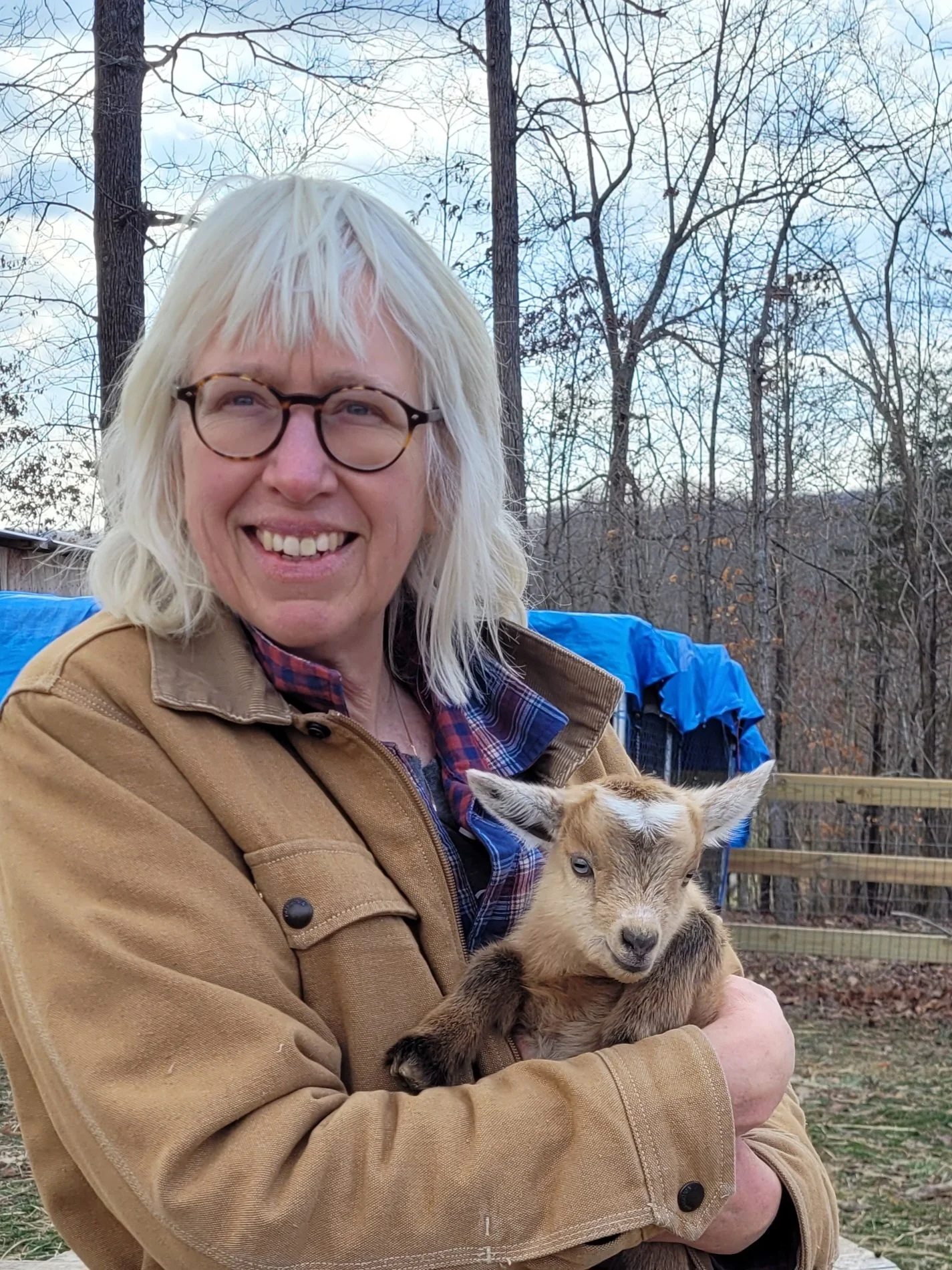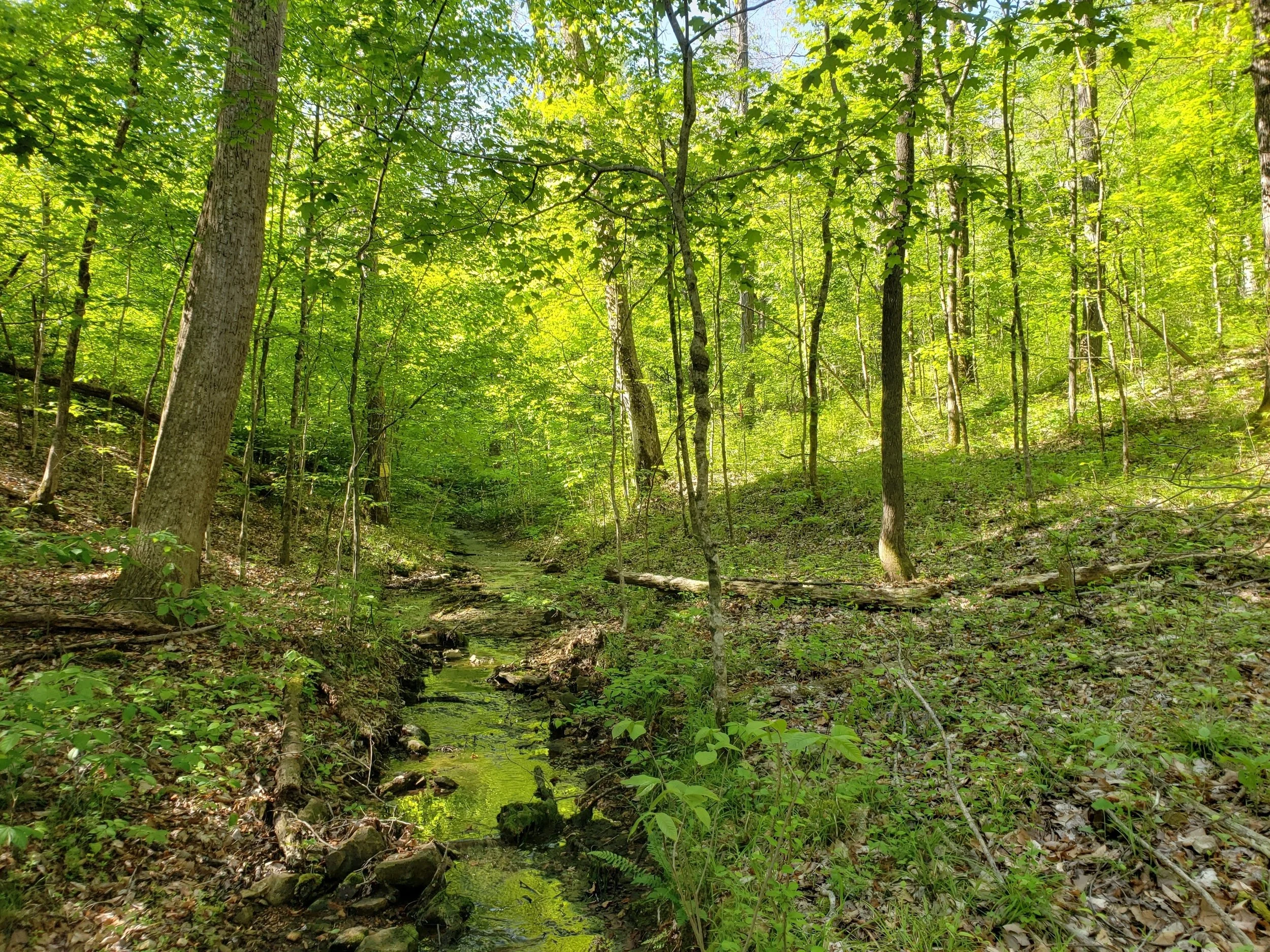Erica
The wrong way forward
“We are long-term landowners in Dickson County, first buying beautiful wooded property here in 1970. The natural, unspoiled beauty of the area made us fall in love, and we now own 200 acres, which we manage with invasive removal, selective harvest and very small-scale farming.”
Erica and her family live on 200 acres of beautiful land in Charlotte, Tennessee. Their homestead is very close to Kinder Morgan’s 32-mile methane gas pipeline, which began construction in April 2025, as well as to its the Tennessee Valley Authority’s new gas power plant that is slated to replace an existing coal plant.
Erica lived in Tennessee until she was 7 and then spent the rest of her childhood in Wisconsin. She came back regularly to camp and visit with friends. Then in 2019, she and her husband returned to Tennessee for good, to the land that had graced her with so many fond memories since childhood.
Erica recalls that she learned about the proposed buildout of a gas power plant and pipeline in the area after seeing a Facebook post about a community meeting from a local Appalachian Voices organizer, so she went to find out about the nearby Cumberland Pipeline threat.
“The Cumberland gas facility would lie near enough to our land to affect our tributaries and air quality,” she says.
Erica has submitted comments to the Federal Energy Regulatory Commission and made calls to TVA opposing these gas projects, citing her family’s and neighbors’ serious concerns about pipeline safety and environmental destruction as well as the high, volatile costs from the gas buildout that would be passed on to customers.
She sees incidents like the July 2022 breach of a Tennessee oil pipeline, caused by an industrial strength lawn mower during a routine brush clearing, as evidence that these pipelines are not safe — not for people and not for the waterways they criss-cross from her land all the way to the Cumberland River, and beyond.
“We feed into the Cumberland River, and all that water goes to somebody,” Erica points out. She notes that there can be helpful overlap between communities of farmers, hunters, kayakers and conservationists, who are often on the same page when it comes to protecting water and air for the future of life in their shared communities.
“Even if all parties don’t share the same overt political views,” Erica says, “we can still work together to make things better for our neighbors.”
A magnificent oak tree straddling the boundary between Erica's property and her neighbor's.
Erica recounts a story of camaraderie with one of her neighbors. “This oak tree is on the property line — literally half of the tree is on our property and half is on the neighbor’s — if you can do that to a tree! I remember asking him if we could put a swing up for when the kids would visit. And the tree gave us something in common to talk about and helped us get to know each other. The tree is just such a beautiful living being … And rural neighbors are very important. So we may not have a lot in common in some ways,” she offers. “But sharing the tree brings us together in a good way.”
Indeed, Erica says people give her hope. “People are complicated. And maybe if we have time to talk to people one-on-one, maybe we can understand each other better.”
When asked about the ways she would rather see TVA address our region’s energy needs, she points out that the public utility must be more careful about the decisions it makes that affect the environment.
“Instead of just saying they need this new pipeline because the population is growing, I’d like to see them be more thoughtful and grow smarter,” she offers. She is attracted to the kind of activism that invites people to think differently, to think about old problems in new ways.
“Beside the potential safety hazards, it also seems like a high public cost for low citizen value with the primary gain being to the gas project, not to the state of Tennessee and its population,” she says.
Erica is retired from teaching and spends her time gardening, learning about permaculture and caring for animals and the land. She wants to see the state’s priorities shift towards using less energy overall and wants TVA to encourage more energy efficiency and renewables. She understands there is a great diversity of options available to utilities depending on where they operate, all without extracting more fossil fuels.
“We have solar here,” Erica says. “We probably get about 60% of our energy needs from that. We worked with LightWave Solar, which I believe is out of Antioch, Tennessee. They took care of all of the permitting and paperwork for the 30% tax credit, which was authorized as part of the Inflation Reduction Act.”
The IRA was signed into law in 2022 and includes programs that promote clean energy investment.
Meanwhile, TVA says this gas buildout is part of its slated intention to “bridge” its way from coal to renewables via methane gas, which is yet another source of potent greenhouse emissions.
Aside from listening to and reading NPR, Slate and a variety of podcasts for news and research, Erica appreciates the work of Mariam Kaba, a prison abolitionist who talks about hope as a discipline. “We can’t give up hope. We have to find hope in our lives and remember that it’s a discipline," she says, referencing Kaba’s work. This pipeline fight is one of the ways she sees she can act.
“I’ve been reading and thinking about how we protect ourselves and our own internal sense of peace while also not ignoring what is happening in our world,” Erica says.
Streamside hardwoods and wild edibles on Erica's land.
With all the stress this pipeline is causing her community and the devastating fires, floods, hurricanes and other effects of climate change around the globe, Erica is very disappointed with the lack of outreach and transparency from TVA.
“It’s much easier to not do something harmful than to have to go back and undo something harmful. Instead of putting in this new gas infrastructure after TVA shows up with a farce of a public meeting,” she asks, “could we have a real and meaningful community discussion about alternatives? Then we could talk democratically about future plans instead of having them forced on us and then having to clean up the mess later.”
By Holley Evergreen Roberts, based on a 2024 interview with Erica (she/her)


